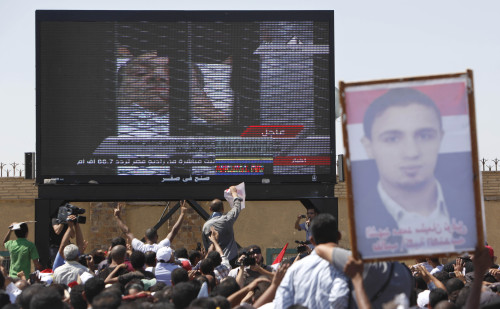Sight of former dictator lying helpless in bed stuns Middle East
CAIRO (AP) ― From a bed inside the defendants’ cage, an ashen-faced Hosni Mubarak showed a glimmer of his old defiance. Egypt’s former president wagged his finger in the air and denied all charges against him Wednesday as he went on trial for alleged corruption and complicity in the deaths of protesters who helped drive him from power.
The spectacle, watched live on state television by millions of Egyptians, calmed the fury of those who suffered under his rule ― some of them parents of children gunned down during the uprising that toppled the longtime president.
 |
Egyptians cheer as they watch Hosni Mubarak in court on charges of murder and corruption. (AP-Yonhap News) |
The father of a slain protester, among those sweltering in the heat outside the courtroom on the third day of the Muslim holy month of Ramadan, was ecstatic.
“The biggest achievement of this revolution is that all these crooks and scum are in a cage,” said Mohammed Mustafa El-Aqqad. “We’re here to tell Hosni, ‘Happy Ramadan. Congratulations on your new cage.”’
The ailing 83-year-old Mubarak lay on a hospital bed as his sons, one-time heir apparent Gamal and wealthy businessman Alaa, stood protectively beside him, at times trying to shield their father from the camera and hundreds of spectators. Dressed in white prison uniforms, the two younger Mubaraks denied charges of corruption.
The sight of Mubarak lying helplessly in bed inside the grim metal and wire cage was a stunning moment for Egyptians ― and for a region known more for its presidents-for-life and absolute monarchs than democracy or accountability.
With Arab Spring revolts sweeping the Middle East, the sight of Mubarak during Wednesday’s hearing could serve as a powerful cautionary tale for other autocratic leaders who have long acted as if they alone were fit to rule. From Libya’s Moammar Gadhafi to Syria’s Bashar Assad and Yemen’s Ali Abdullah Saleh, the lesson of Mubarak’s predicament may be very simple: Don’t lose.
People watching the spectacle across the region proclaimed it a watershed.
“This is the beginning of democracy in the Arab world,” declared Rabha Idris, an engineer from Libya, where the uprising against Gadhafi’s rule is into its seventh month.
“This is a new era,” enthused Zainab Hassan, a 22-year-old university student from Bahrain, a tiny Gulf Arab nation whose Muslim Shiite majority is demanding equality with the Sunni minority. “The people now believe they can be free from dictatorship.”
Many in Egypt savored the humiliation of the man who ruled with unquestionable power for 29 years, during which opponents were tortured, corruption was rife, poverty was widespread and political life was stifled.
With skepticism that Egypt’s military rulers would allow one of their own ― a former air force commander and a war hero ― to be prosecuted in front of the world, the scene went a long way toward satisfying a key demand that has united protesters since Feb. 11, when Mubarak fell following an 18-day uprising.
“This is the dream of Egyptians, to see him like this, humiliated like he humiliated them for the last 30 years,” said Ghada Ali, the mother of a 17-year old girl in the city of Alexandria who was shot to death during the crackdown.
“I want to see their heart explode like my daughter’s heart exploded from their single bullet,” she said, breaking down in sobs.
Still, the sight of Mubarak being wheeled into the courtroom in a hospital bed may win him some sympathy, said lawyer Fathy Abul-Hassan, who represents several victims’ families.
“The defense strategy is to milk whatever sympathy Egyptians may still have for an 83-year-old, bedridden leader. It is an obvious ruse,” he said, standing next to the father of a 22-year-old protester killed in Cairo on Jan. 28.
Wednesday’s hearing was held in a large lecture room at the national police academy in a suburb east of Cairo. Big enough for at least 1,000 people, it was only about a third full with lawyers, witnesses, the media and policemen, including a hundred or so young police conscripts who succumbed to the fatigue of the dawn-to-dusk Ramadan fast and fell asleep halfway through the four-hour proceedings.
The police trainees filled a section of the room next to the defendants’ cage, leaving the three judges and five prosecutors with the only direct view of the Mubaraks and seven other defendants.
Authorities had promised earlier that up to 600 people would be able to attend, including relatives of slain protesters, but after multiple administrative mix-ups, only a handful of relatives were in the courtroom.
The hearing was chaotic at times, with lawyers shouting over each other and pushing forward toward the bench. Presiding judge Ahmed Rifaat struggled to maintain order.
Mubarak’s arrival in the courtroom was greeted by a lone shout of “Long live the revolution!” by a female lawyer attending on behalf of one of the victims. It was one of the few outbursts of anti-Mubarak rhetoric, with another lawyer telling the judge: “Your honor, those murderers standing before you have sold their conscience to the devil.”
The hearing was the first time Egyptians had seen Mubarak since Feb. 10, when he gave a defiant TV address refusing to resign.
In the courtroom, a prosecutor read the charges against Mubarak ― that he was an accomplice along with then-Interior Minister Habib el-Adly in the “intentional and premeditated murder of peaceful protesters” and that he and his sons received gifts from a prominent businessman in return for guaranteeing a low price in a land deal with the state.








